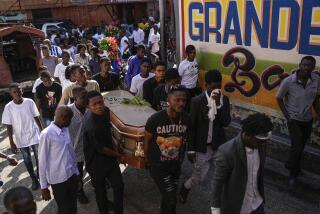S. Africa Ignores Clemency Pleas, Executes Black Killer : Outraged Blacks Chase Whites Through Downtown Johannesburg
- Share via
PRETORIA, South Africa — Benjamin Moloise, a black supporter of the African National Congress convicted of killing a police officer, was hanged today despite worldwide appeals for clemency. Thousands of outraged blacks chased whites through the streets of Johannesburg afterward, attacking policemen and civilians.
One officer was stabbed and two were beaten, and at least seven civilians were injured.
Moloise, a 30-year-old upholsterer and poet, who claimed his innocence to the end, was hanged at 7 a.m. at Pretoria Central Prison.
Moloise’s mother, Mamike, 53, said she was refused entrance to the prison at 6 a.m. but marched past the prison gates about an hour later, saying, “I am prepared to be arrested because that is my son.”
Guards then allowed her in, but Moloise already had been executed. Mamike Moloise said she was not allowed to see her son, only his closed coffin.
Begged to See Son
“I did not expect this government to be so cruel,” she said. She said that when she was barred from entering the prison, “I begged, I said, ‘It’s the last time, that’s my son.’ ”
In downtown Johannesburg, police charged into an initial crowd of about 300 blacks who were dancing and chanting freedom slogans after holding a memorial service for Moloise. A policeman was stabbed, and 12 people were arrested.
Some youths pelted the police with small stones. Windows of at least three stores were smashed and one store was looted.
Thousands of blacks gathered to watch as police broke up small pockets of people up and down the street. The Moloise family had attended the service.
Later, in a rare eruption of tension downtown, blacks chased whites through the streets.
Police were driven back at one point by a hail of stones and a police convoy was pelted with milk bottles. The officers brought in dogs in an attempt to control the crowd.
A white policeman, stabbed, blood oozing through his blue uniform, was rushed to hospital in a police car.
Blacks attacked a white man who had hit blacks looting a shop, smashing a bottle over his head. A black with a broom then beat him to the ground.
A white woman was briefly dragged along the pavement by a crowd in the heart of the city’s shopping area.
Convicted of Killing Black
Moloise was convicted of killing a black policeman, Warrant Officer Philipis Selepe, in 1982. The officer was cut down by automatic weapons fire outside his home in Pretoria.
Moloise admitted that he helped plan the killing and was in the area but claimed that he merely accompanied the killers to counter their suspicions that he was a police agent.
The outlawed African National Congress guerrilla group, which has its headquarters in Lusaka, Zambia, says that it ordered Selepe slain for his role in arresting guerrilla saboteurs, but that Maloise was not the killer.
Moloise’s execution was the fifth of a self-proclaimed supporter or member of the ANC, the main guerrilla group fighting the South Africa’s regime.
No Protests
Mamike Moloise, her husband, Robert, and three other relatives emerged from the prison singing a protest hymn, with fists raised. Several dozen police with snapping dogs and rifles kept reporters back. No protests developed.
The mother slumped on the shoulder of her lawyer, Priscilla Jana, and was embraced by Winnie Mandela, wife of jailed ANC leader Nelson Mandela.
On Thursday, Mamike Moloise said her son had told her that on his way to the gallows he would sing a hymn praising anti-apartheid guerrillas.
Moloise was an unpublished poet, and some of his verse was read aloud by his lawyer at a news conference. One of his poems ends:
The storm of oppression will be followed by the rain of my blood.
I am proud to give my life, my solitary life.
There were fears the execution would set off more violence against apartheid, the system of race laws that guarantees privilege for South Africa’s 5 million whites and denies rights to its 24 million blacks. More than 750 people already have died in 14 months of unrest, most of them blacks.
A black reporter in Soweto, the township outside Johannesburg, said police today mounted one of their largest security operations since the unrest began in August, 1984.
He said dozens of armored police vehicles cruised the streets and stood parked at intersections. Soweto was relatively quiet but extremely tense, the reporter said.
Mourners Dispersed
Mamike Moloise said police fired tear gas to disperse 200 to 300 mourners at an all-night vigil at her home in Soweto.
More to Read
Sign up for Essential California
The most important California stories and recommendations in your inbox every morning.
You may occasionally receive promotional content from the Los Angeles Times.












